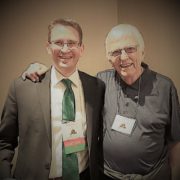Former Florida Supreme Court Justice: Divorce Doesn’t Belong In Court
Rosemary Barkett, the first female Chief Justice of the Florida Supreme Court and former federal judge of the U.S. Court of Appeals for the 11th Circuit believes that the court system is not an appropriate place to resolve divorce-related matters.
![[PORTRAIT: Justice Rosemary Barkett]](http://www.floridasupremecourt.org/about/gallery/barkett.jpg)
Below are excerpts from a series of interviews of Justice Barkett conducted between 2006-2009 and recorded as part of the American Bar Association Senior Lawyers Division Women Trailblazers in the Law program:
And while we are talking about families, we also need to restructure our courts and how they should handle the separation of a family – in divorces, domestic violence, and juvenile courts…The whole idea of divorce court seemed to me a very poor way to deal with the separation of a family unit.
***
Well, the whole adversary system, at least, as it used to be, is horrendous and ill suited to family matters. The problems don’t really lend themselves to solutions by a court in an adversary process, I don’t think. The adversary process only seems to exacerbate the hostilities generated so often in divorce. And trying to maintain two homes on the same income that was used for one seems insoluble and has to be addressed in a better and more comprehensive way. In addition to economic issues, there are questions of who gets to live in the house pending the divorce, how to address the psychological damage that is occurring to all of the parties, how to deal with issues of physical abuse, all while the process generates many more problems in a family that’s already troubled to begin with. Like many other issues, this one needs to be addressed in some comprehensive way instead of trying patch little sub-issues one at a
time.
Since the time of this interview, many Florida family law attorneys have agreed with Justice Barkett and become trained in a comprehensive, out-of-court, non-adversarial process known as collaborative divorce.
In collaborative divorce, each spouse retains his or her own attorney who focuses solely on helping them reach an agreement. The attorneys are contractually barred from engaging in contested court hearings or filing adversarial pleadings and motions, so no time or money is wasted on opposition research or trying to tear down the other spouse.
If the spouses cannot reach an agreement via the collaborative process and feel that they must get a judge to decide issues like where their children sleep at night, then they must fire their collaborative attorneys. This gives the attorneys incentive to help the clients come up with solutions rather than fight. It is also helpful to know that around 90% of collaborative cases end up with the parties reaching a full agreement, and an additional 2% end with the parties reconciling.
Further, to address the emotional component of divorce, a neutral facilitator with a counseling background is generally retained. The facilitator ensures that communication remains positive and future-focused, and that the spouses can reach solutions based on their interests rather than rigid positions. The facilitator will keep an eye on non-verbal communication and, if there is a history of domestic violence, he or she will develop a plan so that each parties’ safety is met and voice is heard.
Additionally, the spouses usually retain a neutral financial professional. The financial professional aids full and fair disclosure between the parties, helps develop tailored plans for support and the division of assets and debts, and eases the financial transition from married life to single life.
Though I have not seen comments from Judge Barkett about collaborative divorce, it would seem to me that it addresses many of the shortcomings she identified in the court system.
If you have questions regarding how collaborative divorce can help your family in Tampa Bay, schedule a consultation with Family Diplomacy: A Collaborative Law Firm at (813) 443-0615 or fill out our contact form.
—
Adam B. Cordover now practices exclusively in out-of-court dispute resolution. He is also president of Next Generation Divorce, one of the nation’s largest collaborative practice group with attorneys, mental health professionals, and financial professionals helping families in Hillsborough, Pinellas, Pasco, Manatee, and Sarasota counties.






Leave a Reply
Want to join the discussion?Feel free to contribute!